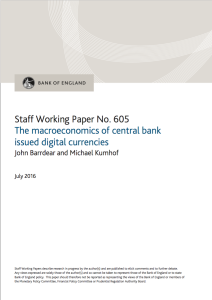Bank of England releases key paper on digital cash and blockchain


The Bank of England has just released its most significant paper yet. Macroeconomics of central bank issued digital currencies, by John Barrdear and Michael Kumhof, discusses the consequences of the central bank making a digital form of cash available to the general public, so that they are no longer forced to use bank deposits to make electronic payments:
“We study the macroeconomic consequences of issuing central bank digital currency (CBDC) — a universally accessible and interest-bearing central bank liability, implemented via distributed ledgers, that competes with bank deposits as medium of exchange. In a DSGE model calibrated to match the pre-crisis United States, we find that CBDC issuance of 30% of GDP, against government bonds, could permanently raise GDP by as much as 3%, due to reductions in real interest rates, distortionary taxes, and monetary transaction costs. Countercyclical CBDC price or quantity rules, as a second monetary policy instrument, could substantially improve the central bank’s ability to stabilise the business cycle.”
The paper is based on a complex economic model in which anyone can hold money at the central bank, fully risk-free, as an alternative to bank deposits (money created by banks).
The first 16 pages are written in plain English and well worth a read, although the model itself (pages 17-50) will be hard-going or even unintelligible unless you’ve studied DSGE modelling approach and high-level maths. The results section, from page 50 onwards, are more technical than the intro but still free of equations.
We’re working through the paper in detail to understand the findings and what they imply for our work on a sovereign money system. However, here are some highlights from the introductory section:
The paper essentially models a partial Sovereign Money System in which anyone can hold their money in the form of risk-free digital cash created by central bank. This gives the public an alternative to bank deposits. However, banks would still be able to create money.
In the model, digital cash is created only when the central bank purchases bonds from households or investors. The paper does not consider what would happen if the central bank created digital cash to finance government services or tax cuts, although it notes these questions for future research.
The model suggests that the introduction of digital cash would have some key benefits:
It could boost GDP by around 3%, due to “reductions in real interest rates, in distortionary tax rates, and in monetary transaction costs…’.
It can give the central bank a second monetary policy tool to stabilise the economy.
It could improve financial stability.
The paper flags up the fact that the transition could be risky and needs to be well managed.
In the section on Pros and Cons of CBDC, the paper confirms many of the advantages that we also covered in our paper Digital Cash: Why central banks should issue an electronic money.